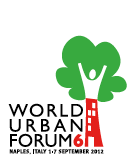The Sixth World Forum facilitated innovative thinking on urban development while recognizing current and future challenges for cities and towns.
Forum highlights included the launch of two UN-HABITAT publications: “State of World's Cities Report 2012/2013: The Prosperity of Cities,” and “Youth in the Prosperity of Cities: State of the Urban Youth Report 2012-2013,” as well as the Global Network on Safer Cities and the Manifesto for Cities.
 6 September 2012: The Sixth World Urban Forum, organized by the UN Human Settlements Programme (UN-HABITAT) in collaboration with the Government of Italy, the Campania Region, and the Province and City of Naples, convened from 2-6 September 2012, in Naples, Italy. The Forum addressed the theme “The Urban Future,” and featured six thematic dialogues, including one on environment, urban mobility and energy.
6 September 2012: The Sixth World Urban Forum, organized by the UN Human Settlements Programme (UN-HABITAT) in collaboration with the Government of Italy, the Campania Region, and the Province and City of Naples, convened from 2-6 September 2012, in Naples, Italy. The Forum addressed the theme “The Urban Future,” and featured six thematic dialogues, including one on environment, urban mobility and energy.
The Forum aimed to facilitate innovative thinking on urban development, recognizing factors that increase demands on the capacity of cities and towns to address citizens’ needs. The Forum also considered preparations for the Third UN Conference on Housing and Sustainable Urban Development (HABITAT III) in 2016.
Several publications were launched at the Forum, including UN-HABITAT’s “State of World’s Cities Report 2012/2013: The Prosperity of Cities.” This report recommends a more inclusive notion of development and prosperity, to include additional dimensions such as adequate infrastructure, environmental sustainability, equity, productivity and quality of life. Speaking at the launch, Joan Clos, UN-HABITAT Executive Director, said UN-HABITAT “advocates for a new type of city – the city of the 21st century – that is a ‘good’, people centered city.”
UN-HABITAT also introduced “The City Prosperity Index” (CPI), a new tool to measure present and future progress of cities. The CPI uses a multi-dimensioned approach of prosperity to help decision-makers identify opportunities to achieve prosperity and design policy interventions.
UN-HABITAT also launched “Youth in the Prosperity of Cities: State of the Urban Youth Report 2012-2013,” describing challenges faced by urban youth such as economic and social exclusion, growing informal economies and unemployment. At the World Urban Youth Assembly on 2 September, participants called for empowering youth and ensuring their role in decision-making processes, noting that youth constitute the majority of the world’s population.
Similarly, the Gender Equality Action Assembly on 2 September highlighted women’s role in economic activities and called for gender equality and empowerment of women. Additional Forum highlights included the announcement of the 2012 Scroll of Honour Winners for their contribution to improving city and town living conditions; the launch of the Global Network on Safer Cities, a network that advocates for local crime prevention and urban safety; and the Manifesto for Cities, a document reflecting the consensus of partners in promoting the Habitat Agenda.
At the closing ceremony, speakers stressed the importance of achieving a sustainable urban future. Achim Steiner, UN Environment Programme (UNEP) Executive Director, stressed cooperation to achieve sustainable urbanization. He said, “sustainable urbanization, lessening poverty and such related issues can only be tackled jointly and not in isolation.” Delegates committed to reinvigorating national forums in their countries to address urbanization issues.
During the Forum it was announced that Medellin, Colombia, would host WUF 7, in 2014. [UN-HABITAT Webpage for WUF 6] [Programme of Events] [UN-HABITAT Press Release: State of the World’s Cities and CPI] [UN Non-Governmental Liaison Service Press Release] [UN-HABITAT Press Release, 6 September] [UN-HABITAT Press Release, 5 September] [Webcast of Dialogue on Urban Mobility, Energy and Environment]